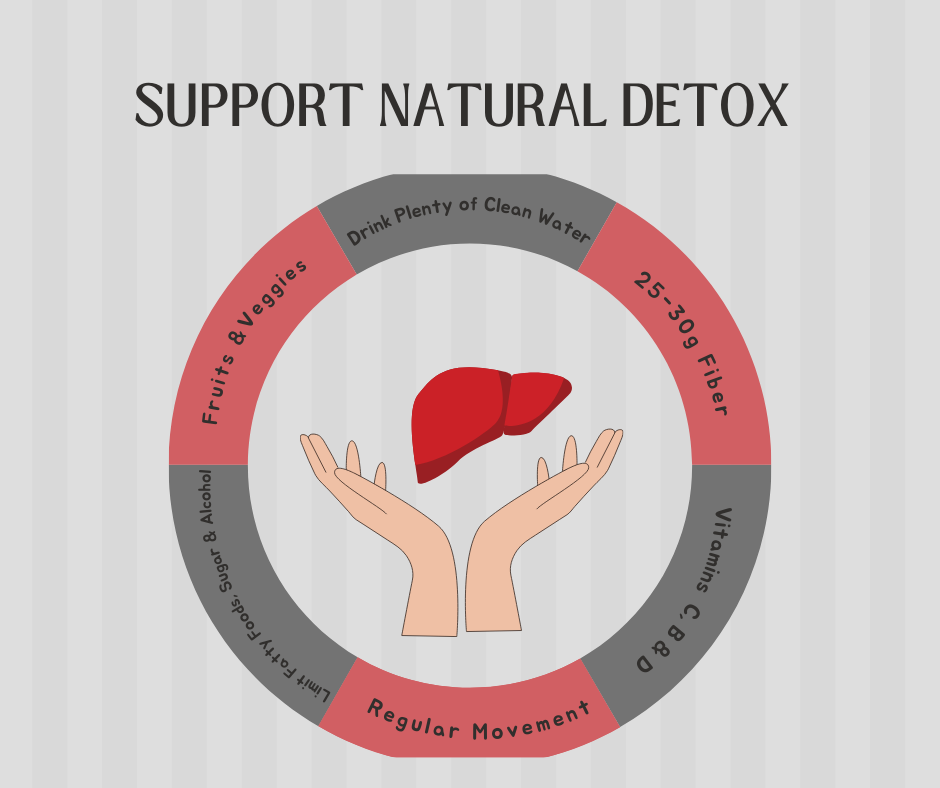Considering starting the year off with a cleanse or a detox diet? You can skip the trendy stuff and kick off the New Year with a few healthy habits.
You don’t need to drink some fancy gross tasting drink three times a day to “flush out” toxins. You just need to consume a variety of healthy natural foods that provide key vitamins and minerals which will support your body’s natural filtering system. The liver is considered the first step in detoxification, followed by your gut, kidneys and lymphatic system. All of these organs are working on detoxification daily. You can support your organs by focusing on a variety of whole foods and limiting highly processed foods, excess sugar and alcohol.
Without going down a scary path, you should know, our bodies are exposed to toxins every day. Some are naturally occurring, the byproducts of metabolism, as well as cholesterol, and hormones. Where others are from external exposure, such as alcohol, medications, drugs, household chemicals, pesticides, insecticides, mold and industrial chemicals. External toxins can enter the body through the nose, mouth, and skin and then move into the bloodstream where they are brought to the liver for removal.
The liver’s detoxification process happens in three stages. Phase 1 needs key nutrients to support it, phase 2 has additional needs, and phase 3 is the elimination process. In order for these phases to properly remove toxins they need to be supported in each phase. During phase 1, toxins are transformed into intermediate substances. These intermediates are neutralized by key antioxidants before moving onto Phase 2. During Phase 2, intermediate substances are transformed into water soluble compounds which are then excreted from the body as bile, stool, serum, urine and sweat. If the body doesn’t have enough key nutrients needed, then toxins will not be removed and will be recycled back into the body. It’s this concept that drives the theory that your body is full of toxins.
So how can you naturally support detoxification?
- Drink plenty of clean water
- Consume a variety of fresh fruit and vegetables daily. Eating a variety of fruit and vegetables can provide various phytonutrients making sure you are covering all the needed vitamins and minerals needed to support the detoxification process
- Support elimination. Aim for 25-30 grams of fiber per day through consumption of whole grains, fibrous vegetables, and legumes.
- Limit processed foods, fatty foods, sugar and alcohol. These can stress the liver’s natural function.
The accumulation of toxins and poor diet can contribute towards inflammation and chronic health conditions such as cardiovascular disease, type 2 diabetes, and fatty liver disease.
Want to go that extra step to support the phases of detoxification? Incorporate these key nutrients into your daily routine:
- Vitamin C is a powerful antioxidant that’s safe and easy to add into your diet. Consume citrus fruit, bell peppers, or even add some ascorbic acid to your water. Just be mindful of your threshold, high amounts of vitamin C can cause mild GI upset.
- B vitamins are essential for phase 1 of liver detox. B vitamins act as important cofactors in many of the body’s metabolic pathways, including methylation. Including B6, B9, and B12 rich foods into your diet can support these pathways. Do this by eating a variety of meats, peanuts, dark leafy greens and legumes.
- Sulforaphane is a phytochemical found in foods such as broccoli, brussels sprouts and cabbage. Sulforaphane is an essential part of the detoxification process and activates the production of phase 2 liver enzymes.
- Vitamin D. (I can’t say it enough!) Vitamin D deficiency contributes to the development of so many health conditions, including fatty liver disease. Vitamin D plays a role in calcium balance, cell differentiation, immunity, insulin secretion, blood pressure regulation, anti inflammation and more. Vitamin D is mainly produced in the skin from the sun. Dietary sources include fatty fish such as herring and salmon, or minimally from dark leafy vegetables and mushrooms. Supplementation of vitamin D is often needed especially for those who have limited sun exposure or live in the northeast. Talk with your doctor or better yet have your serum 25-hydroxyvitamin D levels tested for specific dosing.
As always, the best ways to stay healthy is by minimizing exposure to toxins, maintaining a healthy diet, drinking plenty of clean water, and keeping moving.

